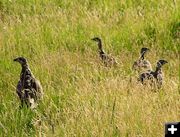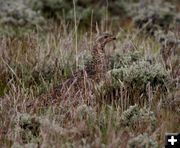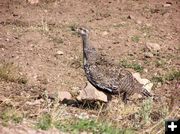Sage Grouse habitat management guidelines available
by Wyoming Game & Fish
October 6, 2007
Landowners and land managers are alerted a comprehensive guide to maintaining and improving sage grouse habitat is available from the Wyoming Game and Fish Department.
This set of guidelines provides detailed recommendations to landowners and mangers to maintain and enhance sagebrush habitats used by sage grouse in Wyoming. It recognizes that sagebrush habitats are part of a dynamic ecosystem that has been altered by natural and human-caused actions.
The sage grouse, as a species dependent on sagebrush for survival, is a landscape species requiring broad expanses of diverse habitats associated with the sagebrush steppe communities. “This paper attempts to apply the sage grouse habitat management guidelines developed for sage grouse populations across the West to Wyoming using data collected from research conducted in Wyoming where possible,” said Joe Bohne, Game and Fish staff wildlife biologist.
The guidelines are intended to assist land managers developing habitat management objectives and projects in occupied sage grouse habitat. Given the declines in sage grouse populations in Wyoming over the last 60 years, it is necessary and prudent to manage these sagebrush habitats to maintain and enhance existing populations of sage grouse by addressing the particular habitat needs for the trademark game bird in Wyoming. The 39-page guidelines are available on the Game and Fish Web site at http://gf.state.wy.us/ and selecting sage grouse guidelines on the right side bar.
The guidelines take a landscape scale or “big picture,” year-round perspective of sage grouse habitat requirements and management, Bohne said.
He said the development of the guidelines is particularly timely with statewide focus on the bird from local working groups and individual citizens to the Governor’s Sage Grouse Implementation Team and the continuing debate over the need for habitat mitigation for sage grouse resulting from energy developments. The guidelines offer suggestions to minimize disturbance to sage grouse when sagebrush habitat is altered by other land use activities or when projects are proposed to improve wildlife habitat or livestock grazing.
Bohne adds cost-sharing may be available for private landowners wanting to improve sage grouse habitat through the Natural Resource Conservation Service, the Wyoming Wildlife Natural Resource Trust or the local sage grouse working groups. He suggests landowners contact the nearest Game and Fish habitat extension biologist or regional Game and Fish office for more information on the guidelines or possible funding options for potential projects.
Photos by Pinedale Online!
|


